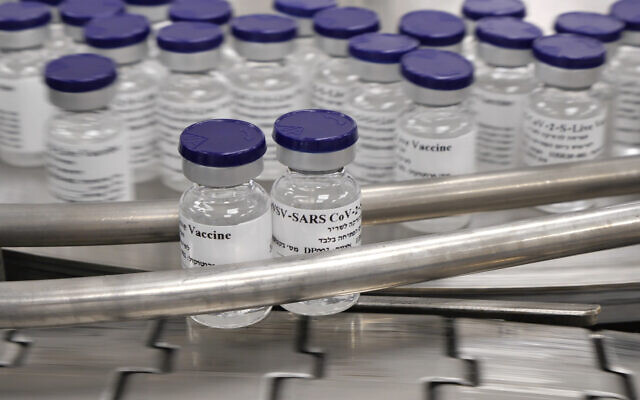Health officials said preparing to inoculate 80,000 a day, weighing local approval without FDA; Health Ministry chief warns of new restrictions as infections rise

Israel may receive up to four million doses of Pfizer’s coronavirus vaccine by the end of this month — enough for two million people — and the Health Ministry is preparing health maintenance organizations for the possibility of inoculating some 80,000 Israelis every day, Israeli TV networks reported Thursday.
Such a development could see up to a fifth of Israel’s population vaccinated by January — a far more optimistic projection than previously assumed.
The vaccines may start arriving as early as next week, though they will still not be used as they have not yet received approval from the US Food and Drug Administration, Channel 12 News reported.
And according to Channel 13, health officials are weighing whether to give approval to the vaccine before the FDA does, potentially allowing Israel to begin distributing shots. The FDA is expected to convene on Wednesday to review the Pfizer vaccine and may approve it next week.
Channel 12 said Health Ministry Director-General Chezy Levy held a meeting with the heads of Israel’s health maintenance organizations in recent days and updated them on the matter, citing participants in the meeting.
It said the HMOs were told to prepare to inoculate up to 80,000 people a day.
The report said the ministry was making intensive preparations for the logistics involved in moving and storing the vaccines. The shots use state-of-the-art mRNA technology and require constant intense cooling at subzero temperatures, thus necessitate complex infrastructure not needed by current inoculations.

Earlier Thursday during an interview with Channel 12, Deputy Health Minister Yoav Kisch raised eyebrows when he said that the ministers who make up the so-called coronavirus cabinet were not convening, despite the rising infection rates, due to “all kinds of developments that I cannot get into.”
It appeared that Kisch was referencing the news of the large batch of expected vaccines, which could have major repercussions for government policy moving forward.
Britain on Wednesday became the first country to approve Pfizer’s COVID-19 vaccine for general use and said it would be introduced next week.
Renewed lockdowns
In a Thursday press conference, Director-General Levy warned of possible renewed lockdown measures meant to mitigate the country’s newly rising infection rates.
“We are considering more restrictions. A lockdown on Hannuka and curfew are possibilities that are being considered,” he said.
According to the Health Ministry, 1,568 new coronavirus infections were confirmed on Wednesday, the highest daily rate since October 15, when Israel was still under a full nationwide lockdown.

At the press conference, Levy compared Wednesday’s number of coronavirus cases to the number of daily cases at the beginning of November, which was around 600 a day. Lecy pointed out that the numbers had more than doubled.
He added that the rise in infections was country-wide, and was no longer confined to specific demographics or parts of the country.
“If we talked about the rise in infections in just the Arab sector of late, we are now seeing a rise [of infections] in the general population,” Levy said.
A central reason for the rise of infections, according to Levy, was people returning from countries with high coronavirus rates and failing to properly isolate.
“I want to point out, unfortunately, a high infection rate among returnees from Turkey. We intend to enforce isolation measures on all people returning from ‘red’ countries. When this does not take place, infection rates rise.”
Travelers returning from such countries are required to enter quarantine for two weeks upon returning to Israel.
Levy mentioned the long-expected coronavirus vaccine. While noting the optimism generated by reports of the vaccine, Levy warned people against letting their guard down.
“We cannot be complacent. We cannot condition our behavior and be more relaxed and liberal about the rules due to the possibility of being vaccinated against the disease,” he said.
He added that people must continue to wear masks, practice social distancing and personal hygiene and avoid large gatherings in order to live life as normally as possible in the shadow of the virus.
A Thursday report by an army-run coronavirus taskforce warned Israel was on the cusp of a third wave of the pandemic, noting that cases have topped 1,000 on a weekly average. The rise in daily cases was largely not affected by the number of tests, it said.
The Prime Minister’s Office released a statement Thursday night that said Prime Minister Benjamin Netanyahu was discussing the rise in infection rates with the relevant ministers and that the coronavirus cabinet would meet next week.
Months of coalition infighting and the failure to pass a state budget has led to the Knesset voting in favor of a motion to disband and call new elections in a preliminary reading Wednesday.
The motion still needs to be approved by a Knesset committee and then pass three more votes.
As reported by The Times of Israel
